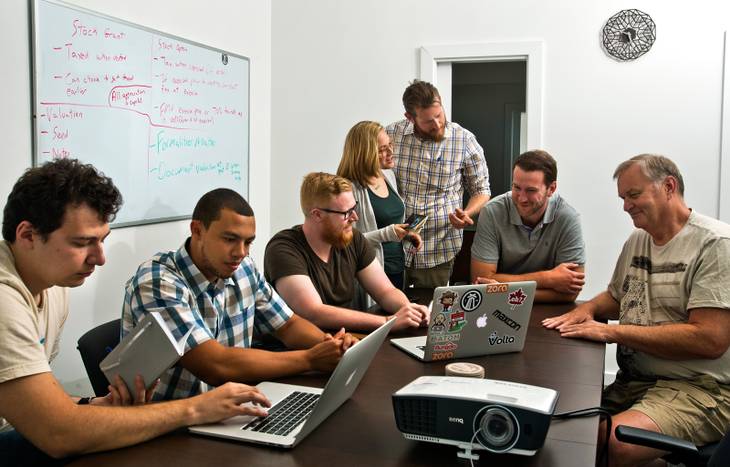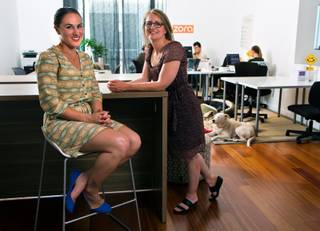On a recent Monday morning, 12 entrepreneurs from across North America sat in a circle in the penthouse of the Newport Lofts luxury high-rise condominiums downtown. Nine had just moved to Las Vegas — two from as far away as Halifax, Nova Scotia. Most had never met previously. They soon would get to know each other very well, though, because they’d spend the next three months working together in close quarters as the inaugural cohort of a new program run by a downtown seed accelerator, the Mill.
Co-founders Sara Hill and Jill Murphy started the Mill in early 2014 with money provided by the Vegas Tech Fund. At the time, Hill worked as director of entrepreneurship at co-working space Work in Progress, another Vegas Tech Fund project.
“I had felt that Vegas needed an accelerator since a couple months after I moved here,” Hill said. “Initially, I talked to so many program directors, people who ran accelerators, hoping we could find someone who would want to open one here.”
It never materialized. So Hill approached Vegas Tech Fund officials with the idea of starting her own. Hill recruited Murphy to help.
The Mill’s first program, the Idea Accelerator, started in early 2014. The Mill gave each company access to mentors and a workspace for two months at Work in Progress. In exchange, the companies agreed to attend events, present their ideas at a monthly meeting called The Grind and give the Vegas Tech Fund the right to participate if a company received additional venture funding in the future.
In its first year, the Mill funded 44 companies. Eight went on to participate in other startup accelerator programs outside Las Vegas, and seven received additional venture capital funding. HashRabbit, which makes software for BitCoin miners, now is listed prominently on the Vegas Tech Fund’s investments page.
But the goal of the Idea Accelerator wasn’t necessarily for companies to receive additional funding; rather, it was for founders to test and discover whether their ideas were viable. Seven participants decided their ideas were not and chose not to pursue them. The Mill still considers those companies successes and lists them as alumni on its website. The only official failure during the first year was one company whose founders stopped answering phone calls part way through the program and missed their scheduled Grind presentation without explanation.
In January, the Mill revamped its program. It moved into its own building, nicknamed “The Loft,” and shifted its focus to larger investments in fewer companies, mirroring a similar change made by the Vegas Tech Fund. The revised Idea Accelerator will sponsor 12 companies this year, one per month. And a new program, the Startup Accelerator, will sponsor two cohorts, each composed of five larger companies. The first cohort just started and will run through June. The second will run from September to December.
The Startup Accelerator is designed for companies further along in development but still too small for traditional venture capital funding. The Mill gives each company $25,000, classes and mentors, and three months of desk space in The Loft. In exchange, the companies give 5 percent ownership of their companies to the Vegas Tech Fund, a $3,000 program fee to the Mill and agree to move to Las Vegas to participate in the program as they work to start their companies.
For the first cohort, The Mill selected Castoff, Fluttrbox, Konsiderate, Zora and Document ProveUp. After the companies relocated, the program started with a two-day retreat designed to build relationships and encourage the teams to support each other.
“The goal of doing all that and making those connections is to build relationships because you never know where those relationships are going to lead,” Hill said.
The culture of support appears to be working. When one team mentioned its application was running on a single home-built Web server, three other teams raced to see who could be first to help the team move its application to Amazon Web Services.
The cohort also is an experimental community. As the teams experiment with their businesses, the Mill is experimenting on the teams to evaluate which aspects of the program work and which it will change for future cohorts. The Mill itself also is an experiment to discover ways to create a sustainable startup community downtown.
In the past, Las Vegas has seen startups such as Romotive leave because they needed resources only available in larger tech communities such as Silicon Valley. The Mill’s companies have more basic needs — housing and transportation.
Two Canadian teams are living at the Gold Spike. Living downtown has not been easy for them, between the noise, the “weirdness of Fremont Street” and the difficulty of finding basics supplies such as groceries.
“It’s not sustainable,” said Fluttrbox’s Aristo Mohit-Coker. “It’s not oriented toward living, it’s still oriented toward tourism.”
Transportation also has been an issue for a few teams, partly because the Mill promotes an ethos called the Lean Startup, which instructs company founders to “get out of the building” and talk to potential customers. The Mill planned to partner with Shift to provide vehicles, but Shift recently closed. Despite the challenges, every team has expressed interest in staying in Las Vegas. Several members commented on how friendly and helpful they found people in the valley, compared with other tech communities.
Nevada’s legislative support of drone testing was of particular interest to Fluttrbox, which depends on unmanned aerial systems and would have been much more difficult to start in any other state.
In some ways, the small size of Las Vegas’ fledgling tech community gives it an advantage. Here, it is much easier to meet key players in the tech community, such as established businesspeople and venture capitalists. The Mill takes advantage of that by introducing members to potential mentors. Such access would be unlikely in places such as Silicon Valley.
“We think this is the next startup boom behind L.A.,” said Castoff’s Blake Arnet.
Editor’s note: David Davis co-founded a company funded by the Mill and currently is participating in the Mill’s Startup Accelerator program.

